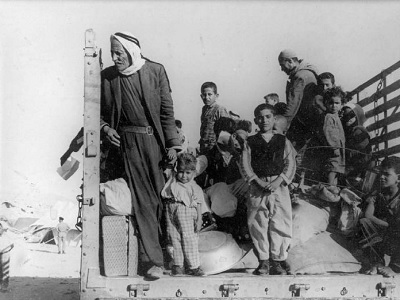
By Mahmoud N. Zidan
On the 11th and 12th May, many Israelis marked the 68th anniversary of their so-called ‘Independence Day’, Yom Haatzmaut, according to the Hebrew Calendar. That day laid the groundwork for implementing the myth of a ‘greater’ Israel – a colonial state par excellence.
Israeli media sources covered the festivities, which included Israeli Air Force flybys, barbecues, picnics, dramatic increase in military presence, excessive television coverage along with a racist rhetoric, and so on. Even Google displayed to its users in the State of Israel, some of whom are Palestinian, a doodle that marked the day.
For Palestinians, however, these were not festive days but rather days of remembrance. Many Palestinians who live in Israel, where Palestinian schools were forced to take the day off and who were ordered to avoid any mention of the Nakba, took to the streets in memory of the losses of Palestinian lives, land, and homes, which was an immediate consequence of the establishment of the State of Israel. Their aim was primarily to keep alive the hope that many Palestinian refugees will return to their homeland.
By virtue of their very presence, they wanted people to be reminded that the Israeli festivities took place on land that was taken by force, land that stands upon the graves of large numbers of Palestinians. The message was loud and clear: The Israeli commemoration is a distortion of history and is predicated on the suffering of other human beings.
But most Palestinians remember their collective loss and express their downright rejection of that distorted version of history on a different day, namely the 15th of May, the notorious day of the partitioning of Palestine. That day had an indelible impact on Palestinians, primarily because it legitimized expelling Palestinian into neighboring states and rendering them refugees.
The so-called legitimacy of the creation of the State of Israel was reinforced by the circulation of the official Israeli narrative, which runs contrary to any reality: Israel did not terrorize or force Palestinians into exile; Palestinians left of their own volition, abandoning their homes and country; and, if that had been really their country, they would have stayed.
Even when some Israelis acknowledge that what happened was an expulsion, they claim that refugees are a natural consequence of any war. Benny Morris, the right-leaning Israeli historian who is also known as a new historian, preposterously suggests that the refugee problem was inevitable and born of war, not by design.
But even the camp in which Morris is typically classified, the new historians, belies this narrative. Palestinians did not become refugees; they were rendered refugees. That creation was part of a systematic plan, termed Plan Dalet by Israeli generals, as Walid Al-Khalidi reminds us.
Israeli state archives confirm the existence of such a plan, as they include statements made by influential Israeli generals and statesmen such as Ben Gurion, Chaim Weizmann, Yitzhak Modai, Yigael Yadin, Moshe Carmel, and many others, all of whose statements show that there was a premeditated plan of transfer.
Palestinians, to quote Norman Finkelstein in his informative book Image and Reality of the Israel-Palestine Conflict did not take flight at the behest of Arab orders. The expulsion of Palestinians was and continues to be a strategic goal of the Israeli colonial machine. A cursory look at the increasing numbers of Palestinian refugees corroborates the existence of such a goal. In 1948, more than 750,000 Palestinians became refugees; and in 1967, Israel made more than 350,000 Palestinians refugees.
In between those two pivotal years in Palestinian history and after 1967, many Palestinians were unobtrusively forced to leave. More and more Palestinians have had to undergo internal displacement and extradition. The numbers and facts are consistent with the stance of the Israeli States stance against Syrian refugees: Netanyahu recently refused to grant asylum to Syrian refugees. Moreover, the State of Israel discriminates against and deports African refugees. Israel, to state the obvious, is consistent in its colonial, discriminatory, and racist policies. In fact, it is not even consistent when it comes to even its own slogans.
The Jewish Defense League, one of the strongest supporters of Israel, popularized the phrase ‘Never Again’ to make people remember that Jews should never be discriminated against in human history. Nevertheless, that slogan is selectively applied, as it ignores the sufferings of other groups of human beings. The grandchildren and children of Palestinian refugees, and the refugees themselves are determined to re-imagine this slogan and make it inclusive of all human beings. For them, there will never be more Palestinian refugees or another Palestinian
Nakba, and their return to their homeland is a legitimate right. More importantly, their suffering, they believe, should not be repeated.
Is the Israeli state willing to come to grips with these facts? Absolutely not! This unwillingness, the supporters of the Israeli colonial machine should remember, is the real threat to the State of Israel.
– Professor Mahmoud Zidan lives in Jordan. He contributed this article to PalestineChronicle.com.




